Text Mining
USING TIDY DATA PRINCIPLES
Acknowledgements

Let’s install some packages
What do we mean by tidy text?

text <- c("Tell all the truth but tell it slant —",
"Success in Circuit lies",
"Too bright for our infirm Delight",
"The Truth's superb surprise",
"As Lightning to the Children eased",
"With explanation kind",
"The Truth must dazzle gradually",
"Or every man be blind —")
text
#> [1] "Tell all the truth but tell it slant —"
#> [2] "Success in Circuit lies"
#> [3] "Too bright for our infirm Delight"
#> [4] "The Truth's superb surprise"
#> [5] "As Lightning to the Children eased"
#> [6] "With explanation kind"
#> [7] "The Truth must dazzle gradually"
#> [8] "Or every man be blind —"What do we mean by tidy text?

library(tidyverse)
text_df <- tibble(line = 1:8, text = text)
text_df
#> # A tibble: 8 × 2
#> line text
#> <int> <chr>
#> 1 1 Tell all the truth but tell it slant —
#> 2 2 Success in Circuit lies
#> 3 3 Too bright for our infirm Delight
#> 4 4 The Truth's superb surprise
#> 5 5 As Lightning to the Children eased
#> 6 6 With explanation kind
#> 7 7 The Truth must dazzle gradually
#> 8 8 Or every man be blind —What do we mean by tidy text?

Jane wants to know…

A tidy text dataset typically has
- more
- fewer
rows than the original, non-tidy text dataset.
Gathering more data
You can access the full text of many public domain works from Project Gutenberg using the gutenbergr package.
library(gutenbergr)
gutenberg_works() %>%
filter(title == "Anne of Green Gables")
#> # A tibble: 1 × 8
#> gutenberg_id title author gutenberg_author_id language gutenberg_bookshelf
#> <int> <chr> <chr> <int> <chr> <chr>
#> 1 45 Anne of … Montg… 36 en Children's Literat…
#> # ℹ 2 more variables: rights <chr>, has_text <lgl>
my_mirror <- gutenberg_get_mirror()
full_text <- gutenberg_download(45, mirror = my_mirror)Time to tidy your text!
What are the most common words?
What do you predict will happen if we run the following code? 🤔
What are the most common words?
What do you predict will happen if we run the following code? 🤔
Stop words
Stop words
Stop words
Stop words
What are the most common words?
U N S C R A M B L E
anti_join(get_stopwords(source = “smart”)) %>%
tidy_book %>%
count(word, sort = TRUE) %>%
geom_col() +
slice_max(n, n = 20) %>%
ggplot(aes(n, fct_reorder(word, n))) +
What are the most common words?

The Freeland Bunker Diaries
Currently 9 journals transcribed from 1871-1880
library(readxl)
journal_1871_1872 <- read_excel("data/journal_1871_1872.xlsx")
journal_1871_1872 %>%
select(date_mdy, month, journal_entry) %>%
head()
#> # A tibble: 6 × 3
#> date_mdy month journal_entry
#> <chr> <chr> <chr>
#> 1 12/23/1871 December Was married at home in evening by William Rand Esqr.
#> 2 12/24/1871 December Went to meeting.
#> 3 12/25/1871 December Shooting match all day in the evening to Christmas tree a…
#> 4 12/26/1871 December About home at work jobbing.
#> 5 12/27/1871 December Work about home reed letter from N. H. Higgins Ins agt.
#> 6 12/28/1871 December Work about home.All Journals
journal_1873 <- read_excel("data/journal_1873.xlsx")
journal_1874 <- read_excel("data/journal_1874.xlsx")
journal_1875 <- read_excel("data/journal_1875.xlsx")
journal_1876 <- read_excel("data/journal_1876.xlsx")
journal_1877 <- read_excel("data/journal_1877.xlsx")
journal_1878 <- read_excel("data/journal_1878.xlsx")
journal_1879 <- read_excel("data/journal_1879.xlsx")
journal_1880 <- read_excel("data/journal_1880.xlsx")Keeping Track
# We want to keep track of the journals
journal_1871_1872$journal <- 1
journal_1873$journal <- 2
journal_1874$journal <- 3
journal_1875$journal <- 4
journal_1876$journal <- 5
journal_1877$journal <- 6
journal_1878$journal <- 7
journal_1879$journal <- 8
journal_1880$journal <- 9
journals <- dplyr::bind_rows(journal_1871_1872, journal_1873, journal_1874,
journal_1875, journal_1876, journal_1877,
journal_1878, journal_1879, journal_1880)Tidy Journals
library(lubridate)
(tidy_journal <- journals %>%
select(date_mdy, month, journal_entry, journal) %>%
mutate(date_mdy = mdy(date_mdy)) %>%
mutate(year = year(date_mdy)) %>%
unnest_tokens(word, journal_entry) %>%
mutate(word = case_when(word %in% c("reed", "read") ~ "received",
TRUE ~ word)))
#> # A tibble: 65,125 × 5
#> date_mdy month journal year word
#> <date> <chr> <dbl> <dbl> <chr>
#> 1 1871-12-23 December 1 1871 was
#> 2 1871-12-23 December 1 1871 married
#> 3 1871-12-23 December 1 1871 at
#> 4 1871-12-23 December 1 1871 home
#> 5 1871-12-23 December 1 1871 in
#> 6 1871-12-23 December 1 1871 evening
#> 7 1871-12-23 December 1 1871 by
#> 8 1871-12-23 December 1 1871 william
#> 9 1871-12-23 December 1 1871 rand
#> 10 1871-12-23 December 1 1871 esqr
#> # ℹ 65,115 more rowsMost common words
Removing stop words
Journal 1: Boats, Meals, Goods 🍳 ⛵🦞 🪵
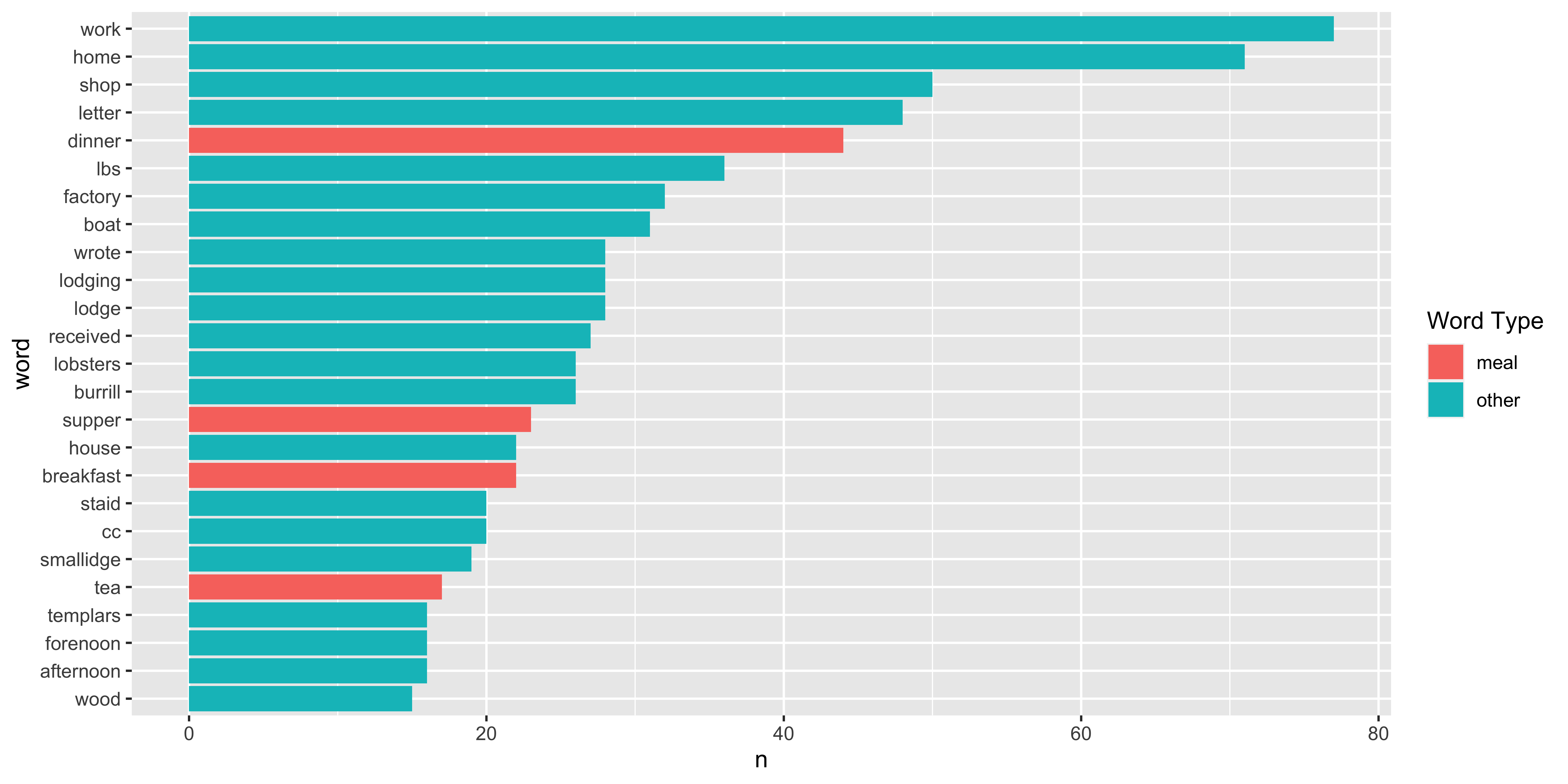
Journal 2: Wind and Weather ☁︎ NESW
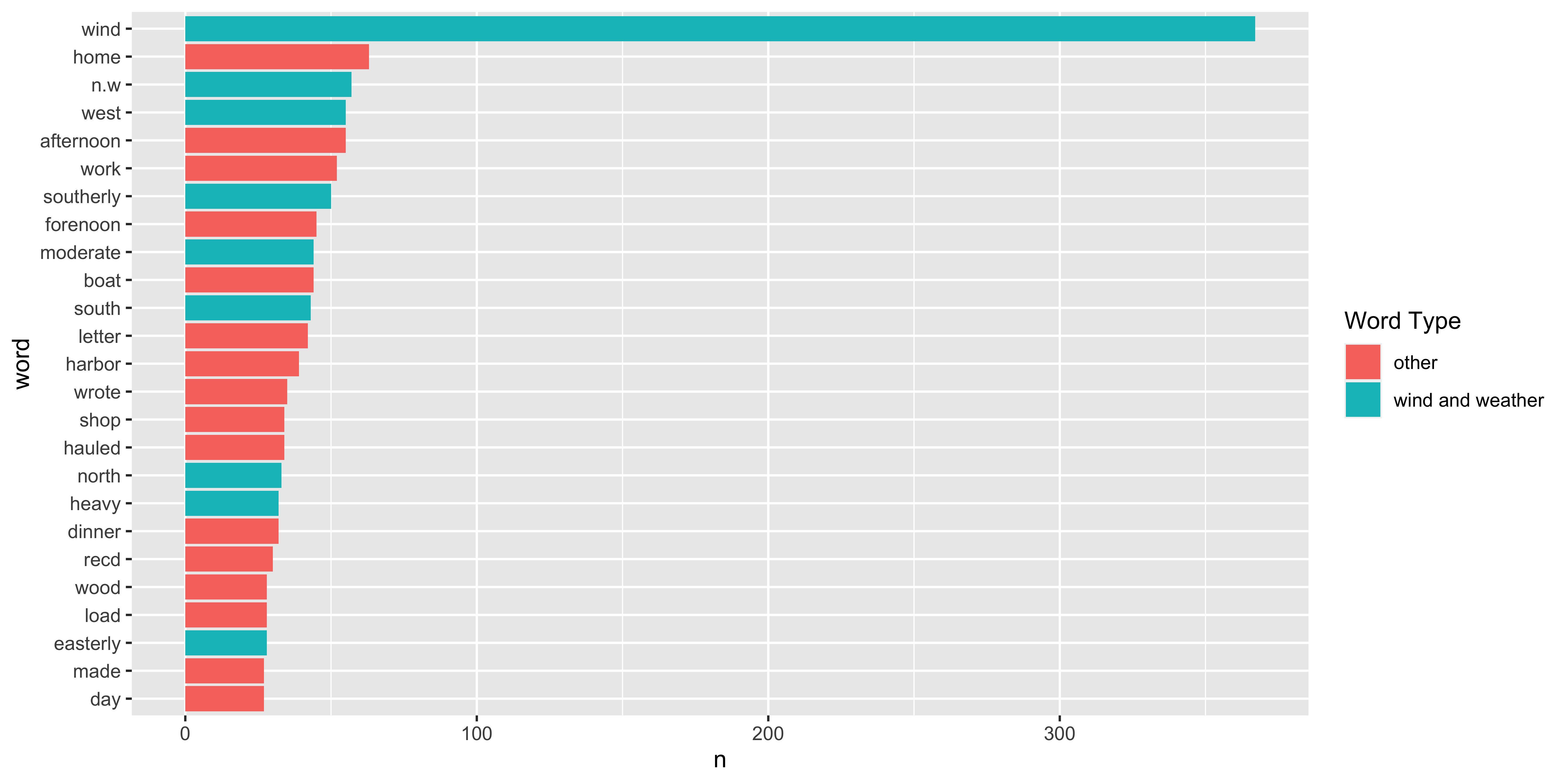
Your Turn: What were the most common words in Journal 3 and 4?
SENTIMENT ANALYSIS
😄😢😠
Sentiment lexicons
Sentiment lexicons
get_sentiments("bing")
#> # A tibble: 6,786 × 2
#> word sentiment
#> <chr> <chr>
#> 1 2-faces negative
#> 2 abnormal negative
#> 3 abolish negative
#> 4 abominable negative
#> 5 abominably negative
#> 6 abominate negative
#> 7 abomination negative
#> 8 abort negative
#> 9 aborted negative
#> 10 aborts negative
#> # ℹ 6,776 more rowsSentiment lexicons
get_sentiments("nrc")
#> # A tibble: 13,872 × 2
#> word sentiment
#> <chr> <chr>
#> 1 abacus trust
#> 2 abandon fear
#> 3 abandon negative
#> 4 abandon sadness
#> 5 abandoned anger
#> 6 abandoned fear
#> 7 abandoned negative
#> 8 abandoned sadness
#> 9 abandonment anger
#> 10 abandonment fear
#> # ℹ 13,862 more rowsSentiment lexicons
get_sentiments("loughran")
#> # A tibble: 4,150 × 2
#> word sentiment
#> <chr> <chr>
#> 1 abandon negative
#> 2 abandoned negative
#> 3 abandoning negative
#> 4 abandonment negative
#> 5 abandonments negative
#> 6 abandons negative
#> 7 abdicated negative
#> 8 abdicates negative
#> 9 abdicating negative
#> 10 abdication negative
#> # ℹ 4,140 more rowsImplementing sentiment analysis
Jane wants to know…

What kind of join is appropriate for sentiment analysis?
- anti_join()
- full_join()
- outer_join()
- inner_join()
Implementing sentiment analysis
What do you predict will happen if we run the following code? 🤔
Implementing sentiment analysis
What do you predict will happen if we run the following code? 🤔
Implementing sentiment analysis
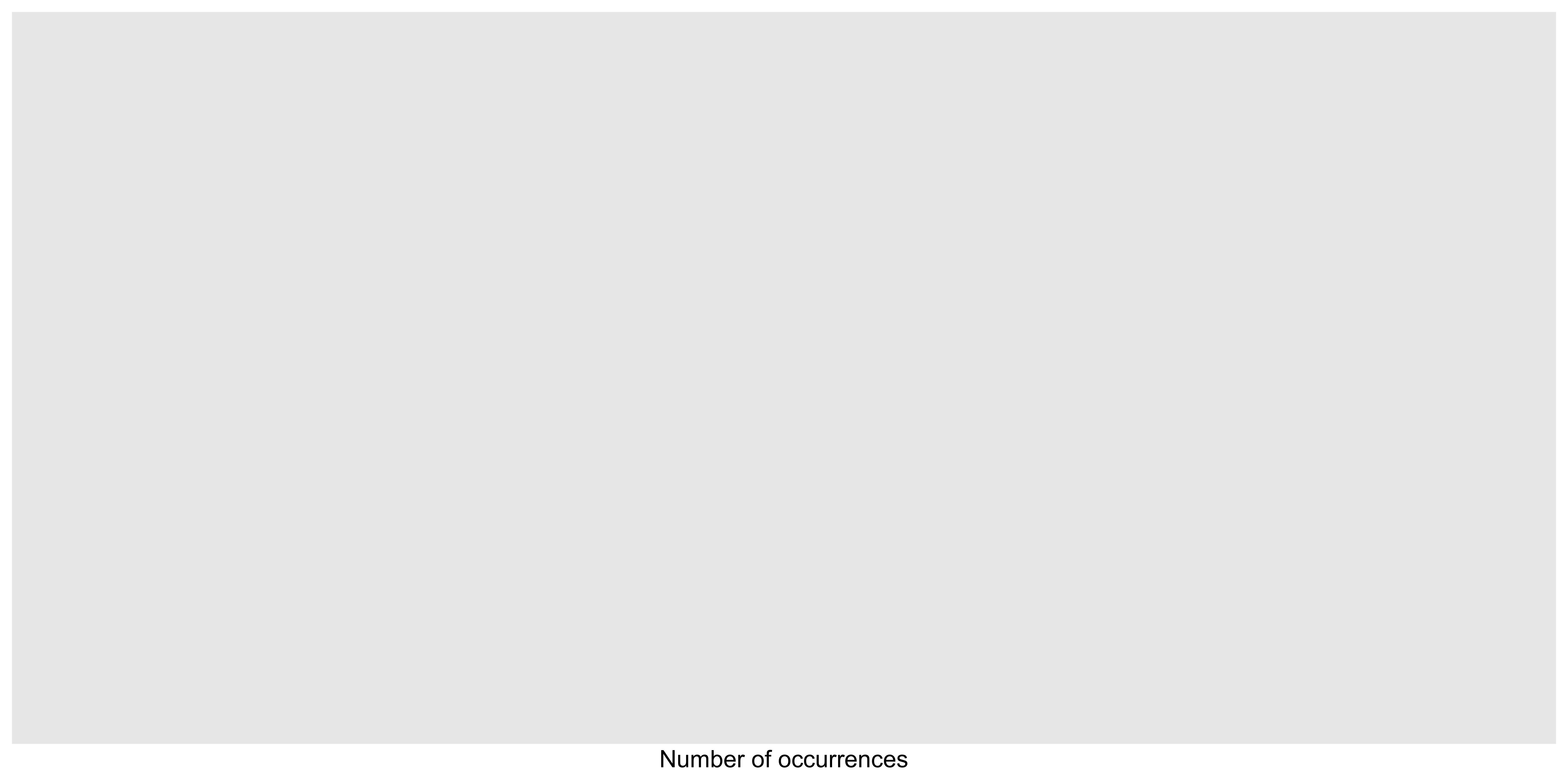
Was Freeland Sentimental?
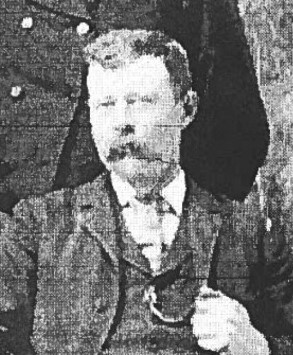
Implementing sentiment analysis
tidy_journal %>%
inner_join(get_sentiments("bing")) %>%
count(sentiment, word, sort = TRUE)
#> # A tibble: 198 × 3
#> sentiment word n
#> <chr> <chr> <int>
#> 1 positive work 802
#> 2 positive breeze 251
#> 3 positive fresh 199
#> 4 positive calm 177
#> 5 positive pleasant 120
#> 6 positive worked 97
#> 7 positive good 85
#> 8 negative cold 75
#> 9 positive ready 73
#> 10 negative dark 71
#> # ℹ 188 more rowsImplementing sentiment analysis
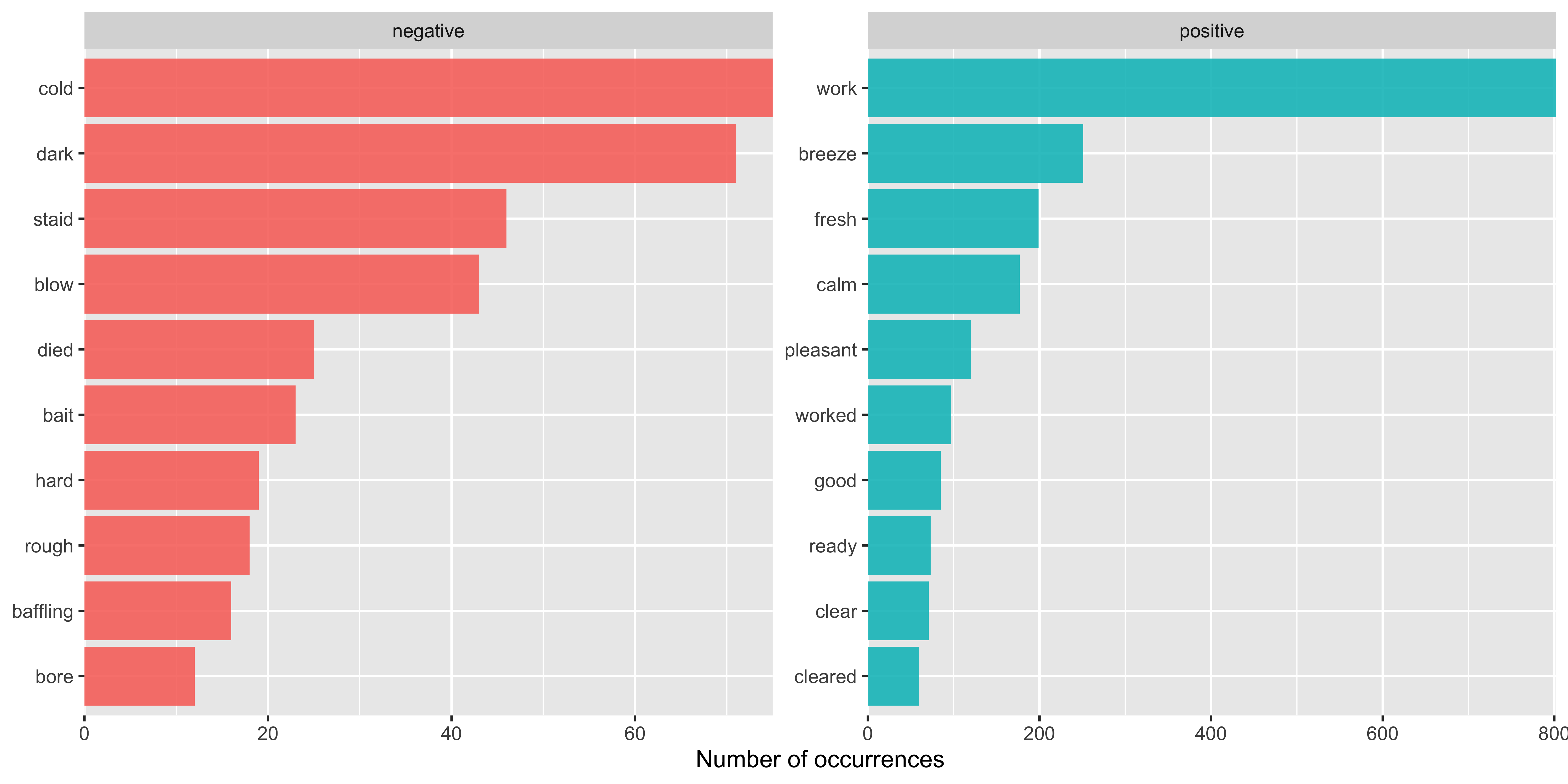
What was the weather like?
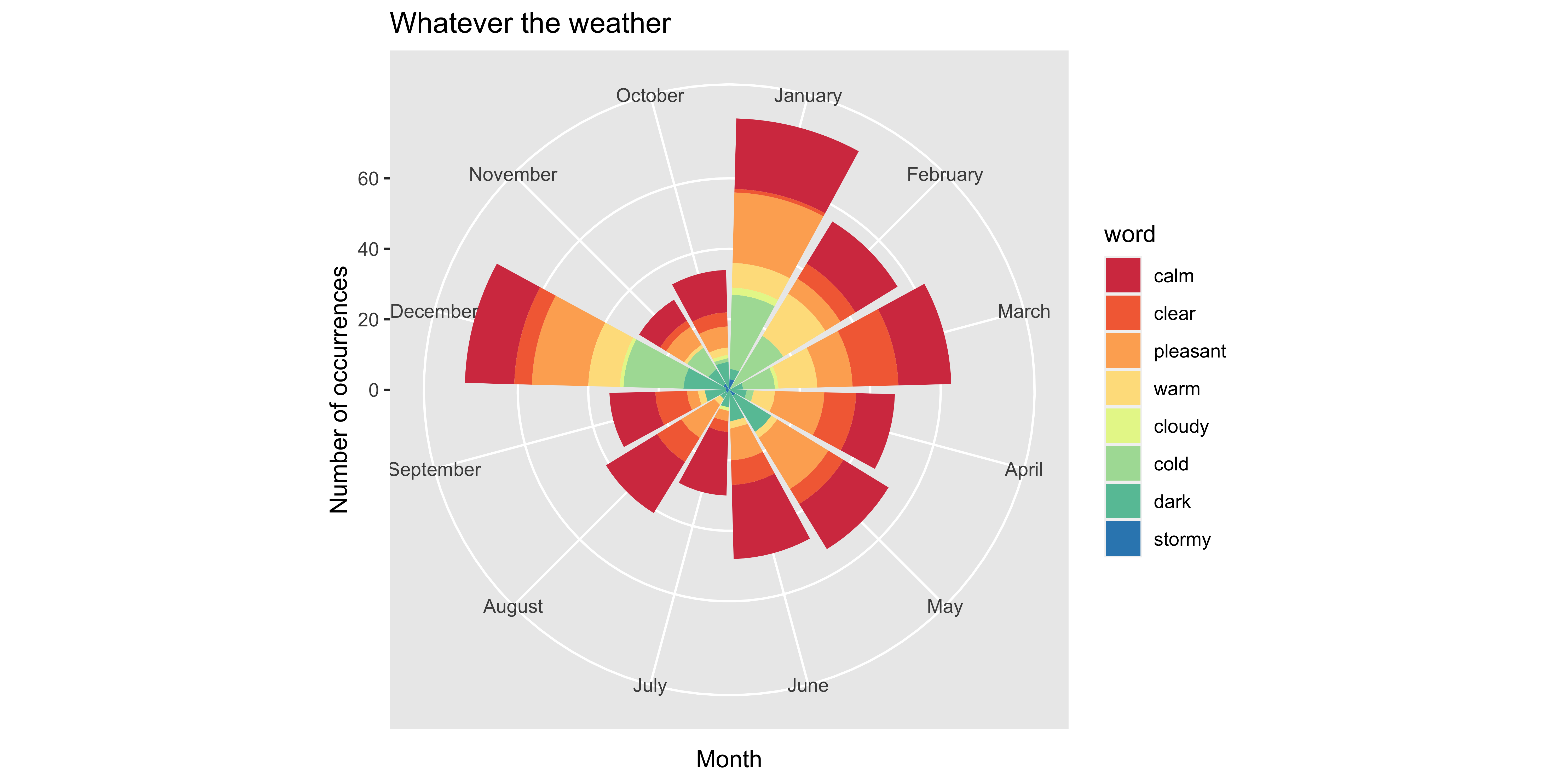
More insight from bigrams!
(tidy_ngram <- journals %>%
mutate(journal_entry = str_replace_all(journal_entry, "south west", "southwest")) %>%
mutate(journal_entry = str_replace_all(journal_entry, "north west", "northwest")) %>%
mutate(journal_entry = str_replace_all(journal_entry, "south east", "southeast")) %>%
mutate(journal_entry = str_replace_all(journal_entry, "north east", "northeast")) %>%
unnest_tokens(bigram, journal_entry, token = "ngrams", n = 2) %>%
drop_na(bigram) %>%
select(journal, bigram, date_mdy))
#> # A tibble: 61,170 × 3
#> journal bigram date_mdy
#> <dbl> <chr> <chr>
#> 1 1 was married 12/23/1871
#> 2 1 married at 12/23/1871
#> 3 1 at home 12/23/1871
#> 4 1 home in 12/23/1871
#> 5 1 in evening 12/23/1871
#> 6 1 evening by 12/23/1871
#> 7 1 by william 12/23/1871
#> 8 1 william rand 12/23/1871
#> 9 1 rand esqr 12/23/1871
#> 10 1 went to 12/24/1871
#> # ℹ 61,160 more rowsN-grams… and beyond! 🚀
tidy_ngram %>%
count(bigram, sort = TRUE)
#> # A tibble: 19,375 × 2
#> bigram n
#> <chr> <int>
#> 1 the wind 2760
#> 2 in the 736
#> 3 wind north 572
#> 4 went to 558
#> 5 wind southerly 543
#> 6 all day 483
#> 7 north west 402
#> 8 wind south 378
#> 9 the afternoon 292
#> 10 work in 273
#> # ℹ 19,365 more rowsJane wants to know…

Can we use an anti_join() now to remove stop words?
- Yes! ✅
- No ☹️
N-grams… and beyond! 🚀
So many wind directions…! 🚀
bigram_counts
#> # A tibble: 7,230 × 3
#> word1 word2 n
#> <chr> <chr> <int>
#> 1 wind north 572
#> 2 wind southerly 543
#> 3 north west 402
#> 4 wind south 378
#> 5 south west 271
#> 6 wrote letter 263
#> 7 wind easterly 243
#> 8 west thermometer 186
#> 9 wind westerly 182
#> 10 fresh breeze 175
#> # ℹ 7,220 more rowsLet’s tidy these up
bigram_counts <- tidy_ngram %>%
separate(bigram, c("word1", "word2"), sep = " ") %>%
filter(!word1 %in% stop_words$word,
!word2 %in% stop_words$word) %>%
mutate(word1 = case_when(word1 == "easterly" ~ "east",
word1 == "southerly" ~ "south",
word1 == "n.w" ~ "northwest",
word1 == "northerly" ~ "north",
word1 == "westerly" ~ "west",
TRUE ~ word1)) %>%
mutate(word2 = case_when(word2 == "easterly" ~ "east",
word2 == "southerly" ~ "south",
word2 == "n.w" ~ "northwest",
word2 == "northerly" ~ "north",
word2 == "westerly" ~ "west",
TRUE ~ word2)) %>%
count(word1, word2, sort = TRUE)Removing wind
bigram_counts %>%
filter(word1 != "wind" & word1 != "north" & word1 != "south")
#> # A tibble: 6,937 × 3
#> word1 word2 n
#> <chr> <chr> <int>
#> 1 wrote letter 263
#> 2 west thermometer 226
#> 3 fresh breeze 175
#> 4 west gouldsboro 116
#> 5 east thermometer 97
#> 6 reed letter 96
#> 7 recd letter 85
#> 8 heavy rain 82
#> 9 wm guptill 67
#> 10 wrote letters 66
#> # ℹ 6,927 more rowsThanks!

Slides created with Quarto